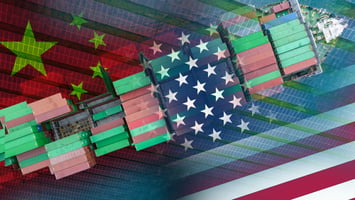Dustin Williamson, Managing Director of vcfo Houston, was featured on The Exit Plan podcast to...
This article was co-authored by Carter Freeman, Lee Ann James, and Jennifer Darby.
Business in Denver 2025 – What Consulting CFOs are Hearing from CEOs and Business Owners
As uncertainty continues to shape the business landscape in 2025, Denver-area CEOs and business owners are navigating a wide web of challenges—from shifting trade policies and looming tariffs to the reduction of government grants and tightening access to capital. We recently sat down with consulting CFOs from vcfo’s Denver office to get their insights on these and other concerns they're hearing from clients and connections, how these issues are impacting Denver-area businesses, and what companies can do to stay agile in an unpredictable environment. This post highlights key takeaways from that conversation.

Carter Freeman
Vice President, Western Region
An accomplished professional with more than 30 years of senior-level financial and accounting experience, Carter embraces new situations, establishes trust, and develops workable game plans.

Lee Ann Perry-James
Consulting CFO
Lee Ann Perry-James is an accomplished consulting CFO with over 25 years of experience in accounting and more than 15 years as a CFO. She effectively executes finance functions strategically, establishes financial and risk controls, and oversees capital structure for private and public entities.

Jennifer Darby
Consulting Controller
A dedicated and experienced finance professional with demonstrated expertise across a wide range of skills, including cost accounting, fixed asset management, inventory management, audit preparation, policy development, budgeting, and accounts payable and receivable.
Freeman: Concerns we’re hearing and helping clients navigate right now are largely industry dependent. Many nonprofits we work with get significant revenue from grants and fear those grants will decrease or potentially disappear altogether in the near future. Those organizations are closely reviewing contracts and grants to determine which are likely to continue and at what level. In parallel, we’re assisting them with contingency planning for what needs to happen if a substantial portion of that funding is lost.
The life sciences space in Colorado (comprised mainly of emerging life sciences companies) is the eighth largest biotech hub in the nation. Emerging life sciences companies need capital to advance. Last year, some $2B was raised in Colorado’s bioscience space. ~$500M of that amount was grant money with the rest coming from venture capital and other sources. Biotech CEOs are concerned about what happens if a big portion of that $500M goes away next year. Amplifying that anxiety is that venture capitalists in that space expect to see grant funding almost as a prerequisite to achieve a state of development where the risk is low enough for them to invest. So, lower grant funding also raises a genuine concern about the ripple effect of potentially less venture capital investment.
Darby: There are also concerns across Denver-area businesses that hold large defense- and other government-originated contracts. Some businesses have seen multi-year contracts terminated at the mid-term point or earlier. They’re now trying to form paths for addressing the income and revenue gaps they expect to be facing over the next 9-12 months. Uncertainty about how long and in what way the tariffs situation is going to play out is also complicating the landscape. For example, companies that had been planning to commercialize products they developed under a DoD contract are having to completely reevaluate those plans and assess new questions as the supporting contract may not continue. Will we need to near-source more product components? Are there process elements we can localize? Do new risks introduced outweigh potential and expected benefits?
Several organizations across both grant-centered sectors and those with significant revenue stemming historically from government contracts have had to reduce their workforce. Most are scrutinizing operational expenses to cut costs and preserve cash.
What operational variables and performance metrics do companies need to examine especially closely now given current conditions?
Darby: There is and needs to be a strong focus on cash. Companies need rock-solid answers to questions such as “Where are we at with cash on hand versus plan?” and “What are our days payable and days receivable?”
James: The importance of free cash flow is definitely more focused, as is the ROI for capital projects. The timing and availability of raw materials are also being watched more closely. For example, are delivery windows for key strategic materials widening? Are potential tariffs on these materials being floated?
From a posture standpoint, owners are also focusing more on core competencies and not being as adventurous as they might have been otherwise. It's almost a sense of paralysis because they're watching their free cash flow, trying to accelerate ROI on CapEx projects, and at the same time moderating their growth to ensure they can cash flow it.
Freeman: There's just a lot of concern around uncertainty and instability right now. How much of the concern is an emotional response and how much is real and quantifiable? Will this thing we need have a tariff of X and commensurately have its price go up by Y? If so, what does that mean for me? CEOs manage uncertainty all the time. The nuance now is to navigate the incremental uncertainties of grant funding, contract terminations, and particularly tariffs. It's tough at the moment because tariffs are on, then off, then get partially exempted only to be put back on again, then delayed. At the end of the day, we cannot control what goes on with the tariffs. However, we can control, how we respond and this is what we encourage our clients to focus on.
Clarity is hard to come by right now in Denver’s aerospace sector, too. What used to be a very mature industry dominated by NASA is now comprised of all sorts of rocket and satellite companies that are making the sector here akin to the Wild West again - like an emerging industry. Will this change just make things more expensive? Will tariffs on things historically sourced from or made overseas compel them to be made domestically because it's less expensive to do so? It's very much an unknown.
James: One thing companies can’t do is allow uncertainty about tariffs, interest rates, grants, and other factors we’re talking about lull them into sitting on their hands and doing nothing. This is a time to shore up operations, examine the back-office, automate and streamline processes, improve financial reporting, and strengthen data analysis. In short, executives and business owners need to control what they can control so they can get the clearest picture possible of where they are which improves their ability to respond to whatever may come. For now, businesses need to reaffirm their core strategy and get back to it.
Freeman: vcfo is thankfully in a position to leverage the collective expertise of a wide bench of CFOs, Controllers, and HR professionals. Our team is here to help the executives and owners of Denver-based businesses navigate the uncertainties facing them so they emerge on the other side in the strongest possible position.
---
Request a Free Consultation to learn how vcfo’s proven CFO, Controller, and HR leaders can help your business thrive in the face of uncertainty. We’ve partnered with leaders from over 6,000 businesses in our 29-year history and are ready to put our experience to work for you.


